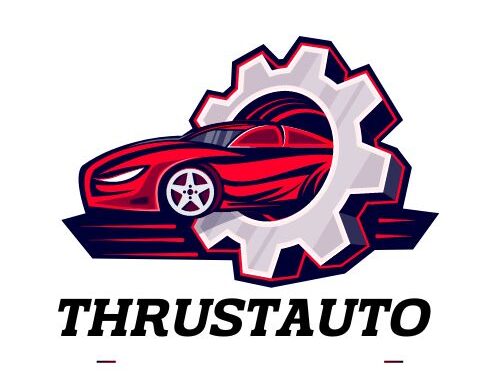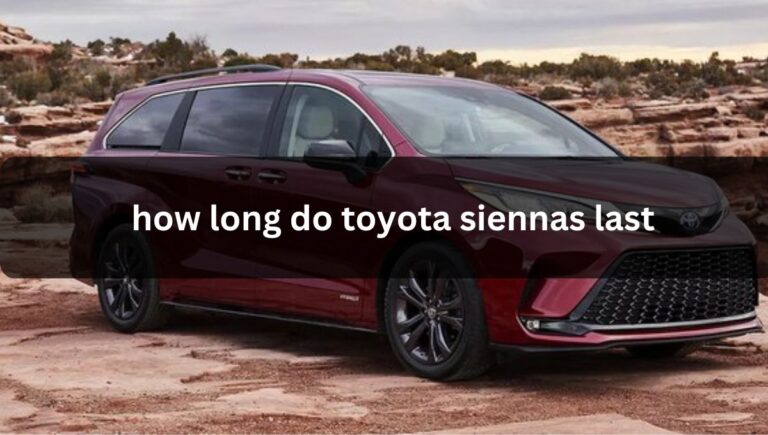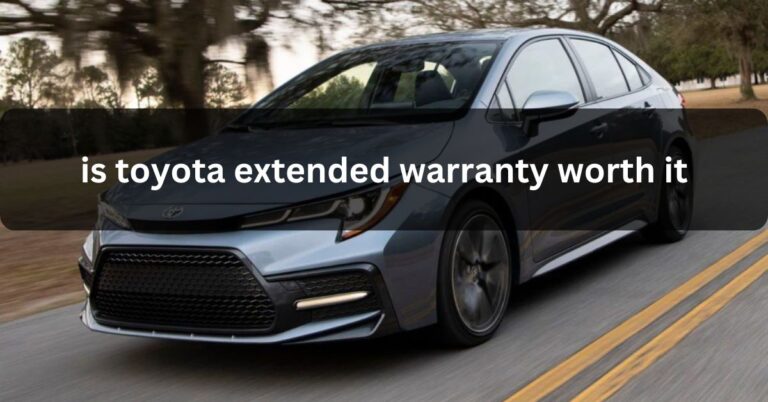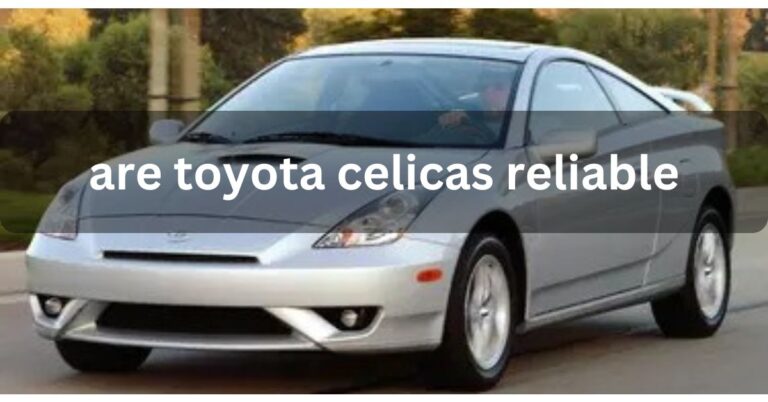How long will a toyota highlander last?
How Long Will A Toyota Highlander Last – Know About It!
From my experience, my Toyota Highlander has been incredibly reliable, hitting 250,000 miles with just routine maintenance. It’s impressive to see how well it continues to perform, proving that with the right care, these vehicles can last well beyond the average expectations.
A Toyota Highlander can typically last between 200,000 and 300,000 miles with proper maintenance. Some owners have reported their Highlanders exceeding 300,000 miles.
Curious how long a Toyota Highlander will last? With good care.
How Many Miles Can a Toyota Highlander Typically Last?
The Toyota Highlander is known for being very reliable and lasting a long time. A Highlander that is well taken care of can usually go between 200,000 and 300,000 miles.
You can get this long of a life if you do regular maintenance like changing the oil, rotating the tires, and checking the fluids. Many drivers find that their Highlander keeps running regularly even as it gets closer to the top of this range if they take good care of it.
What Is the Average Lifespan of a Toyota Highlander with Regular Maintenance?
With regular maintenance, the average lifespan of a Toyota Highlander typically ranges from 200,000 to 300,000 miles. This extended longevity is achievable through consistent upkeep, including timely oil changes, brake inspections, and tire rotations. Adhering to the recommended service schedule helps ensure that the Highlander remains in good condition, allowing it to perform reliably over many years.

How Does the Longevity of a 2024 Toyota Highlander Compare to Previous Models?
Comparing the 2024 Highlander to earlier models, such as the 2015 or 2010 versions, shows that while the core longevity remains consistent, there are notable improvements in efficiency and technology.
The newer model’s turbocharged engine and advanced features enhance driving experience and potentially reduce wear on components compared to older models. Despite these updates, the 2024 Highlander is designed to offer the same dependable lifespan as its predecessors, provided it is well-maintained.
What Maintenance Practices Are Essential to Extend the Life of a Toyota Highlander?
Regular Oil Changes:
Change the engine oil every 5,000 to 7,500 miles to keep the engine properly lubricated and running smoothly.
Routine Tire Rotations:
Rotate tires every 6,000 to 8,000 miles to ensure even wear and extend tire life.
Brake Inspections:
Check the brakes regularly and replace brake pads and rotors as needed to maintain safe and effective braking performance.
Fluid Checks and Top-Ups:
Regularly inspect and top up essential fluids, including transmission fluid, coolant, and brake fluid, to prevent overheating and mechanical issues.
Air Filter Replacement:
Replace the engine air filter every 15,000 to 30,000 miles to ensure optimal engine performance and fuel efficiency.
Battery Maintenance:
Check the battery’s charge and clean any corrosion from the terminals to ensure reliable starts and prevent electrical issues.

Suspension and Steering Checks:
Inspect the suspension and steering components for wear and address any issues to maintain a smooth and controlled ride.
Timing Belt Replacement:
For models with a timing belt, replace it according to the manufacturer’s recommendations, usually around 90,000 to 100,000 miles, to avoid potential engine damage.
Brake Booster’s Vacuum Pump:
Replace the brake booster’s vacuum pump after approximately 120,000 miles to ensure consistent braking performance.
Rust Prevention:
Regularly wash and wax the vehicle, and address any paint damage promptly to prevent rust, especially in areas with harsh weather conditions.
How Does Driving Habits Affect the Longevity of a Toyota Highlander?
What kind of driving habits you have a big impact on how long a Toyota Highlander lasts. The engine, transmission, and brakes last longer when you drive gently, which means slowing down and starting up slowly.
Avoiding active driving habits like hard stops and fast starts can keep these parts from wearing out too quickly and help the car last longer. Maintaining a steady speed and avoiding unnecessary idling can also help save gas and make the engine work better overall.
How Does the Climate Impact the Durability of a Toyota Highlander?
Climate has a big effect on how long a Toyota Highlander lasts and how well it works. For example, parts of the car can wear out faster in places with extreme weather, like places with high temperatures or lots of snow.
Long-term exposure to strong UV rays in hot, sunny places can fade paint and damage the inside of the car. High temperatures can also put extra stress on the engine and cooling system. Using sunshades or parking in shaded areas, as well as checking and keeping the cooling system on a regular basis, can help lessen these effects.

In places where it freezes over a lot, road salt and cold weather can cause rust and corrosion, especially on the brakes and the chassis. To stop this from happening, you need to wash the car often, especially in the winter, to get rid of salt and other dirt.
What Are the Signs That a Toyota Highlander Might Need Major Repairs?
Unusual Engine Noises:
Persistent knocking, grinding, or whining sounds from the engine could indicate serious issues like worn bearings or internal damage.
Frequent Check Engine Light:
If the check engine light frequently illuminates, it could signal underlying problems with the engine, transmission, or emission system that require professional diagnosis.
Transmission Slipping:
Difficulty in shifting gears, slipping, or rough transitions between gears can indicate transmission problems that may need significant repairs or replacement.
Excessive Smoke or Leaks:
Blue, white, or black smoke from the exhaust or noticeable fluid leaks under the vehicle can point to severe engine or transmission issues.
Severe Vibrations or Shaking:
Excessive vibrations or shaking while driving could be a sign of issues with the suspension, tires, or drivetrain components.
Poor Performance or Loss of Power:
A noticeable decrease in acceleration, power, or fuel efficiency can indicate major issues with the engine or fuel system.
Brake Issues:
Grinding noises, a soft or spongy brake pedal, or pulling to one side during braking may suggest significant brake system problems that require immediate attention.
Steering Difficulties:
Difficulty steering, unusual noises when turning, or a loose steering wheel can indicate problems with the steering system or suspension components.
Warning Lights:
Any additional warning lights on the dashboard, such as those for the battery, oil pressure, or ABS, should be investigated promptly as they can indicate serious issues.
Increased Maintenance Costs:
If you’re facing frequent and costly repairs beyond regular maintenance, it might be a sign of larger, underlying issues requiring major repairs.
How Often Should a Toyota Highlander’s Brake Booster’s Vacuum Pump Be Replaced?
In a Toyota Highlander, the vacuum pump for the brake booster is an important part for making sure the brakes work right because it creates the right suction pressure for the booster. Toyota says that the vacuum pump in the brake booster should be replaced every 120,000 miles.
This replacement time helps keep the brakes working at their best and avoids problems like less effective stopping or a spongy brake pedal. Checking the vacuum pump often as part of regular maintenance can also help find any early signs of wear or failure so that it can be replaced on time.
If you don’t replace the brake booster’s vacuum pump at the suggested time, the brakes might not work as well and stopping distances might get longer, which could be unsafe. Making sure this part is replaced on time.
How Does the Highlander’s Model Year Affect Its Overall Lifespan?
The model year of a Toyota Highlander can significantly influence its overall lifespan due to changes in design, engineering, and technology. Newer model years often incorporate updated components and improvements based on feedback and advancements, potentially enhancing durability and performance.

For example, newer models might feature more efficient engines, advanced materials that resist wear and corrosion better, and improved electronics that can contribute to a longer lifespan. As a result, a 2024 Highlander may benefit from enhancements that increase its longevity compared to older models.
FAQS:
Is it worth buying a high-mileage Toyota Highlander?
A well-maintained high-mileage Highlander can still offer good value. It’s important to review the vehicle’s maintenance history and have it inspected by a mechanic before purchasing.
What are common maintenance tasks for a Toyota Highlander to ensure a long lifespan?
Key maintenance tasks include changing the oil every 5,000 to 7,500 miles, rotating tires every 6,000 to 8,000 miles, and replacing the brake booster’s vacuum pump around 120,000 miles.
Does driving in extreme weather conditions affect the Highlander’s durability?
Yes, extreme weather conditions, such as intense heat or cold, can impact the Highlander’s durability. Regular washing, rust-proofing, and using appropriate fluids can help mitigate weather-related wear.
How can I tell if my Highlander is on track to last longer than average?
Regular inspections, a clean maintenance record, and the absence of frequent issues can indicate that your Highlander is likely to last beyond the average mileage.
Conclusion:
A Toyota Highlander usually lasts between 200,000 and 300,000 miles with good care. Some owners have even driven their Highlanders past 300,000 miles. Regular maintenance helps ensure that your Highlander remains dependable and lasts for many years.

I’m Harry Edward, your Toyota car expert. With 5 years of experience in Toyota car repair, I share practical tips and insights to help you keep your vehicle in top condition.
From routine maintenance to fixing common issues, my goal is to make your Toyota ownership experience smooth and enjoyable.







